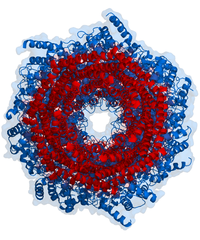
Photo from wikipedia
The ubiquitin-proteasome system degrades most cellular proteins in eukaryotes. UCH37, also known as UCH-L5, is a deubiquitinase binding to Rpn13, a receptor for ubiquitinated substrates in the 26 S proteasome.… Click to show full abstract
The ubiquitin-proteasome system degrades most cellular proteins in eukaryotes. UCH37, also known as UCH-L5, is a deubiquitinase binding to Rpn13, a receptor for ubiquitinated substrates in the 26 S proteasome. But, it remains unclear how UCH37 influences the proteasomal degradation of the ubiquitinated substrates. Because deletion of UCH37 is embryonically lethal in mice, this study aims to investigate the role of UCH37 in proteasomal degradation by constructing the UCH37-deficient cell lines using CRISPR/Cas9 technology. Our results demonstrated that deletion of UCH37 decreased the levels of proteasomal Rpn13, implying that UCH37 might facilitate incorporation of Rpn13 into the proteasome. Meanwhile, deletion of UCH37 decreased the levels of β-catenin and the early endosomal protein Rab8. β-Catenin interacts with TCF/LEF to control transcription, and is involved in development, tissue homeostasis and tumorigenesis. We further found that deletion of UCH37 increased the levels of the ubiquitinated β-catenin and accelerated the hydrogen peroxide-stimulated degradation of β-catenin. Deletion of UCH37 also down-regulated the transcription of c-Myc, a downstream effector of β-catenin, and inhibited cell proliferation and motility. These results raise the possibility that UCH37 maintains the homeostasis of proteasomal degradation reciprocally by assisting the recruitment of the ubiquitin receptor Rpn13 into the proteasome and by reversing ubiquitination of certain critical substrates of the 26 S proteasome.
Journal Title: Acta Biochimica et Biophysica Sinica
Year Published: 2019
Link to full text (if available)
Share on Social Media: Sign Up to like & get
recommendations!